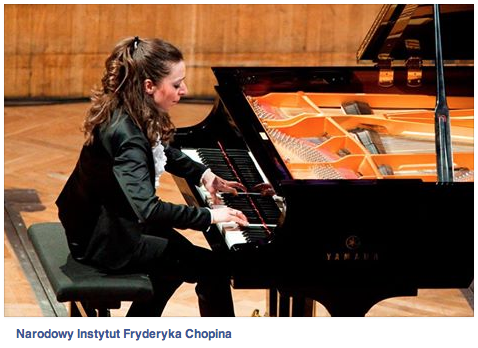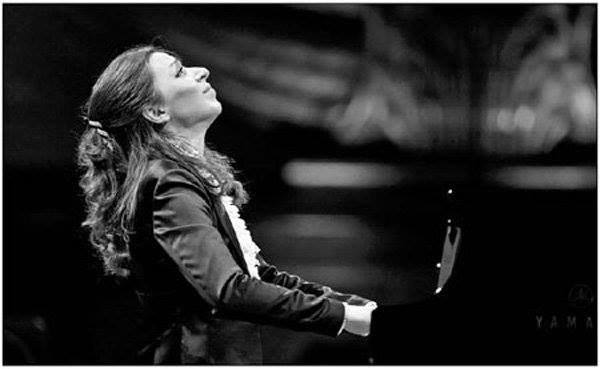Yulianna Avdeeva in Warsaw, 2010
Biographic Notes
2011-10-09 — Original posting (on Blogger)
2014-10-28 — Re-posting as is (WordPress)
2016-06-22 — Brushed up for better readability
Yulianna Avdeeva am Internationalen Chopin-Wettbewerb 2010 in Warschau: persönliche Kommentare — Zusammenfassung
Nachdem ich Yulianna Avdeeva (im deutschen Sprachraum gelegentlich auch als “Juliana Awdejewa” o.ä. geschrieben) zweimal an privaten Klavierrezitalen erlebt hatte, verfolgte ich mit Freunden ihre Aufführungen am Internationalen Chopin-Wettbewerb in Warschau, 2010. Ein Jahr danach sammelte ich meine spontanen Reaktionen und Kommentare in einem Blog-Beitrag.
Table of Contents
Yulianna Avdeeva‘s Success at the Chopin Competition
After Yulianna Avdeeva’s success at the Chopin competition 2010 in Warsaw, I was totally overwhelmed and deeply moved by her interpretations. In the award ceremony, she received not only the first prize, but also the special award for the best performance of a sonata during the competition. The ceremony ended with Yulianna playing Chopin’s concerto op.11. Only then I realized the true value and depth of her art.
In the days after the competition I wrote a couple of comments onto Yulianna’s Facebook page, congratulating her, and expressing my thoughts and opinions about her interpretation. Unfortunately, that FB page soon disappeared, and with it my (and anybody else’s) comments. At a later point, a new FB page was opened for Yulianna; I dug out some of my comments and re-posted them on that new page. Unfortunately, that second page disappeared as well after a while. Texts on Facebook may stay around for a long time. Nevertheless they gradually tend to drown under new messages. As a result, they are progressively harder to access, even if a page does not get erased.
Personal Reactions & Comments on Yulianna’s Success
I now decided to dig up some of my comments on Yulianna’s Success in Warsaw again, in order to give them a “more permanent home” — not primarily for the larger public, but mostly for me and my friends, to keep alive the memory about those days after the competition, which for me were filled with emotions and thoughts about the recent events.
Instant Reaction
I posted the first comment below on the very evening of the award ceremony:
Congrats, Yulianna — you truly deserve this award! I have never seen so much controversy about the outcome of a competition. In discussions with a colleague I had to admit that others were maybe more perfect in the last round. But they probably were also more superficial. You were putting forward emotions and personality at the expense of mere perfection — to the point where you started taking the risk of missing a couple of keys. Or was this due to the stress of the competition?
However, in the concert following the award ceremony everybody else played below their standard — while you played yet a class better than during the competition, presenting an absolutely amazing, professional and fascinating interpretation, leaving no doubt that the jury’s decision was spot-on: I wish you all the best for a splendid career! Will there be a CD recording of the e-minor concerto?
The Day After
The day after I followed up with another comment in a discussion about Yulianna:
We kept our fingers crossed throughout the competition, but we did not dare to hope or assume that you would be the winner among such a large field of strong competitors. We were so glad to see that you were able to keep / maintain your professional attitude and stick to your interpretation throughout the competition. The jury got it right: we hope to hear from & about you again soon! All the best, and thanks again for all these excellent performances. Your interpretations are revealing new aspects in Chopin’s compositions, and they keep them alive!
After a Week
Given the volatility of the texts on Facebook walls (and in particular the number and amount of comments flowing over Yulianna Avdeeva’s wall), I also decided to post a longer comment on the “discussion” part of her page, about a week after the events. Even though by now I would probably use different wording, I’m reproducing the original text here (with only a few typographical edits):
After having watched your gala concert performance several times again, and having compared it with other recordings of op.11, I thought I’d follow up with some comments. With this, I hope to help raising the level of the discussion.
I believe your interpretation deserves more “concrete” appreciation than those “XYZ was better!” type arguments. These are OK as simple votes, but not suited for a real discussion. Worse even are foolish statements such as “that’s not how Chopin is to be played”, or “the jury was biased”. The “mob”, but also those self-elected “custodians of the holy Chopin-grail” uttered such statements in discussions about the contest. Enough of this for now. I don’t want to start another discussion about the contest itself: I have my opinions about this, but that’s a separate topic.
I keep this personal, as it is merely my own thoughts. And I don’t imply that none of this applies to your contenders: they have their merits, too!
Here’s what strikes me / what I like about Yulianna’s interpretation
- You present a very personal interpretation and don’t really care about “common expectations”. Still, as far as I can tell, you are closely following Chopin’s notation, at least to the degree that others do.
- There’s nothing casual in your interpretation. You fill every bar, every tiny figure with meaning, with life and expression. Some people stated that with Emil Gilels there was an abyss in every single interval. That’s exaggerated, but in your playing there’s no shallow passage, never “sheer, empty virtuosity”. Whether it’s a fast or a slow, lyrical movement, you never drop the tension and the emotionality. (This probably makes it hard to “just listen and enjoy”!)
- You make the piano sing, especially in all the lyrical parts in Chopin’s music. I don’t understand how some people can ignore or be untouched by your lyrical passages. For example: in the concerto, in the dialogs with the bassoon in the Romance, where the bassoon and the piano melodies embrace each other. This reminds me of the final duet in Monteverdi’s “Incoronazione di Poppea” … simply marvelous! As a little addendum: it was interesting to see that some of your competitors failed with the slow movement. Sometimes, this is just “celebrated” without real meaning. Also, especially if played (too) slowly, this movement easily loses tension and simply falls apart. In this concerto, not only the fast movements are challenging!
- While in control of the interpretation, you kept close contact with the orchestra and performed with it harmoniously.
More features in Yulianna’s playing that I like
- The more I listen to that performance, the more I realize how much attention you pay to (hidden) second and third (especially middle) voices in polyphonic sections. I discover so many new details that are often hiding among all the other notes!
- Your tempo: you stick to your pace; you don’t try to excel with very rapid playing that later might force you to slow down. At the same time you never seem to feel a need to speed up because a passage otherwise might sound shallow, see above.
- But then there’s your fine agogics and your articulation. I particularly like your rubato! I’ve heard people say that the “true” meaning of rubato (“robbed”, “stolen”) is that you “steal” some time and immediately return it in the next phrase. For me, this remained academic until I heard you play the Rondo in the concerto. One example is in bars 181f. — it instantly was clear to me what this meant. It was masterful—nobody else came even close to this! That said: your rubati were quite a challenge for the orchestra!
- You rarely “play safe”. If there was a choice between perfection / pure virtuosity and playing out what (your) expression demands, you always appear to select the latter. You often take (and master) risks, and you are right: expression is far more important than 100% perfection! The jury of course understands this, whereas laymen like myself easily fall into the trap of counting missed keys, etc.
Towards the end of the Rondo it was refreshing and gratifying to see how much you enjoyed yourself in playing this masterpiece, once you realized that the entire performance met your personal standards and intent!
Yulianna Avdeeva’s Endurance
Finally, your amazing physical endurance: despite all the power and the emotions in your playing, you never appear exhausted – admirable! This already stroke me in the third round of the competition where you were one of the few to place op.61 after the sonata – in which you were (I think) the only one to repeat the exposition in the first movement.
I must confess: after having heard your performance of op.11 a couple times, it is getting hard to appreciate the qualities of other recordings, even with illustrious soloists, and the more I hear your interpretation, the more I know that the jury was right! If people would just open their heart and mind, they might understand and feel the expression and the emotions in your interpretation of Chopin’s works! The interpretation of music is not cast in stone. It is “living” and changes with time. You have added new, refreshing views / aspects into the art of performing Chopin’s works!
Looking forward to hear you playing again soon, be it live or in recordings. I wish you all the best for this coming, challenging part of your well-deserved career!
So much for my comments immediately after the Chopin competition 2010. The last posting above received a comment “Great post!” by the holder of the page (not sure whether it was Yulianna herself).


